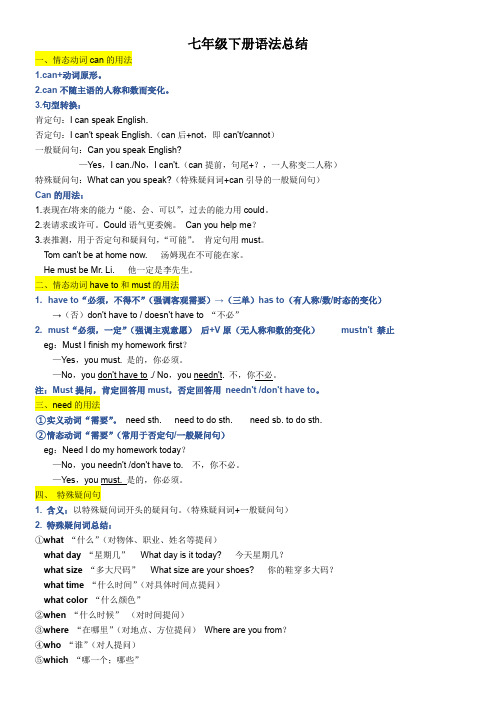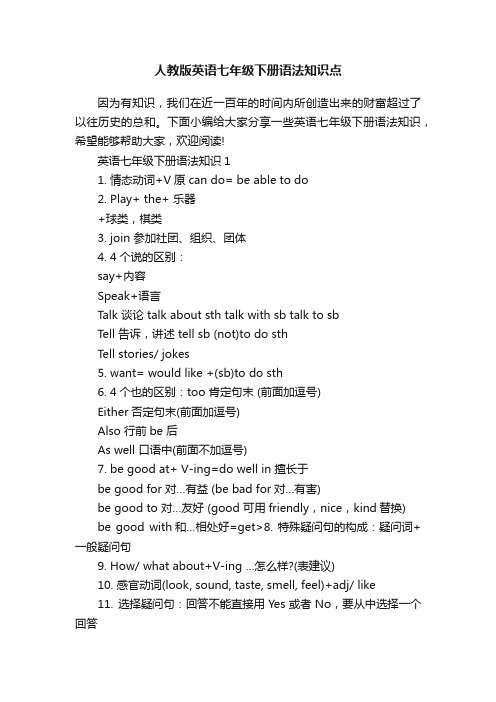人教版七年级下册英语语法点完整版
人教版七年级下册语法点

人教版七年级下册语法点一、现在进行时现在进行时用来表示现在正在进行的动作或状态,构成:be (am/is/are) +动词的现在分词。
例如:1. He is reading a book. (他正在看一本书。
)2. They are playing football. (他们正在踢足球。
)二、一般现在时一般现在时用来表示经常发生的动作、存在的状态或说话人认为是真实的、普遍的事实,构成:动词原形。
例如:1. She likes playing tennis. (她喜欢打网球。
)2. The sun rises in the east. (太阳从东方升起。
)三、一般过去时一般过去时用来表示过去发生的动作或存在的状态,构成:动词的过去式。
例如:1. I visited my grandparents last weekend. (我上周末去看望了我的爷爷奶奶。
)2. They lived in Beijing when they were young. (他们年轻的时候住在北京。
)四、一般将来时一般将来时用来表示将来发生的动作或存在的状态,构成:will +动词原形。
例如:1. She will go to the park tomorrow. (她明天要去公园。
)2. We will have a party next week. (下周我们要开派对。
)五、一般过去将来时一般过去将来时用来表示过去即将发生的动作,构成:would +动词原形。
例如:1. He said he would help me with my homework. (他说他会帮我做作业。
)2. They promised they would come to the party. (他们答应了要来参加这个派对。
)六、过去进行时过去进行时用来表示过去某一时刻正在进行的动作,构成:was/were +动词的现在分词。
例如:1. They were watching TV at 8 o'clock yesterday evening. (昨天晚上8点他们正在看电视。
完整版)新人教版七年级下册英语语法大全

完整版)新人教版七年级下册英语语法大全Please find below the revised and edited n of the article:New n n | All Grammar of Grade 7 English is Here。
Mastered in 15 Minutes!I。
Usage of Modal Verb "Can"Can + verb infinitive does not change with the subject's person or number.1.Affirmative sentence with "can": Subject + can + verb infinitive + others.2.Negative sentence with "can": Subject + can't + verb infinitive + others.3.To make a general n。
move "can" to the beginning: Can + subject + verb infinitive + others。
Positive answer: Yes。
subject + can。
Negative answer: No。
subject + can't.4.Special n with "can": interrogative word + can + subject + verb infinitive + others。
Example: I can speak English。
→ I can'tspeak English。
→ Can you speak English。
→ What can you speak?II。
人教版七年级英语下册语法重点归纳

七年级下册语法总结一、情态动词can的用法1.can+动词原形。
2.can不随主语的人称和数而变化。
3.句型转换:肯定句:I can speak English.否定句:I can't speak English.(can后+not,即can't/cannot)一般疑问句:Can you speak English?—Yes,I can./No,I can't.(can提前,句尾+?,一人称变二人称)特殊疑问句:What can you speak?(特殊疑问词+can引导的一般疑问句)Can的用法:1.表现在/将来的能力“能、会、可以”,过去的能力用could。
2.表请求或许可。
Could语气更委婉。
Can you help me?3.表推测,用于否定句和疑问句,“可能”。
肯定句用must。
Tom can't be at home now. 汤姆现在不可能在家。
He must be Mr. Li. 他一定是李先生。
二、情态动词have to和must的用法1. have to“必须,不得不”(强调客观需要)→(三单)has to(有人称/数/时态的变化)→(否)don't have to / doesn't have to “不必”2. must“必须,一定”(强调主观意愿)后+V原(无人称和数的变化)mustn't 禁止eg:Must I finish my homework first?—Yes,you must. 是的,你必须。
—No,you don't have to ./ No,you needn't. 不,你不必。
注:Must提问,肯定回答用must,否定回答用needn't /don't have to。
三、need的用法①实义动词“需要”。
need sth. need to do sth. need sb. to do sth.②情态动词“需要”(常用于否定句/一般疑问句)eg:Need I do my homework today?—No,you needn't /don't have to. 不,你不必。
人教版七年级英语下全册语法、重点、短语、句型、释疑

红藕香残玉簟秋,轻解罗裳,独上兰舟。
云中谁寄锦书来?雁字回时,月满西楼。
花自飘零水自流,一种相思,两处闲愁。
此情无计可消除,才下眉头,却上心头。
---李清照《一剪梅》Unit 1 Where's your pen pal from?1、记忆本单元重点单词2、特殊疑问句型…来自于…?Where be sb from?回答:sb be from+地点;其中be动词根据sb变化,若为第二人称或者集合代词则用are,若为第三人称的代词则用is。
例如:where are you from?I am from Shaihai.;本句也可以转换为where +助动词+sb+come from?回答:sb come(s) from +地点,其中sb 若为第一人称或者集合名词时则用come,若为第三人称时则用comes。
3、某人住在哪里?Where +助动词(do/does) sb live?回答:sb live(s) in+地点;其中若是第三人称时问句用助动词does,回答用lives如:Where do you live?I live in Paris;Where does he live?he lives in HeFei.4、询问某人说什么语言?What language +助动词+sb speak?回答:sb speak(s) +语言。
其中助动词与sb的关系同第2点中一样。
如:what language do you speak?I speak chinese;你说什么语言啊?我说汉语。
What language does he speak?He speaks English.他说什么语言啊?他说英语。
5、陈述句某人能做某事.sb can do sth.如:I can speak Chinese.我会说汉语。
Can 表示某人的能力理解并翻译下列短文Dear *,My name is Bob.I live in Toronto,Canada,and I want a pen pal in China.I think China is a very interesting country.I'm 14 years old and my birthday is in November.I can speak English and a little French.I have a brother,Paul,and a sister,Sarah.They have pen pals in the United Kingdom and Australia.I like going to the movies with my friends and playing sports.My favorite subject in school is P.E.It's fun.But I don't like math.It's too difficult!Can you write to me soon?YoursBob你能回答下面的问题吗?(1)、Where is Bob from?(2)、What does he want?(3)、What languages does he speak?(4)、What does he like?注解:live in+地点,译为家住在某地;want sth意思为想要sth,在某个月份用in,如在信中用的in November在十一月份;It's fun意思为它有趣,be fun即为有趣,主语可以为人也可以为物;It's too difficult!意思为它太难了,too副词用来修饰difficult形容词,一般形容词只能用形容词或者副词修饰。
完整版)新人教版|七年级下册英语所有语法知识点全汇总

完整版)新人教版|七年级下册英语所有语法知识点全汇总一。
情态动词can的用法can+动词原形,不随主语的人称和数而变化。
肯定句结构为主语+can+谓语动词的原形+其他,否定句结构为主语+can't+动词的原形+其他。
一般疑问句将can提前,结构为Can+主语+动词原形+其他?肯定回答为Yes,主语+can,否定回答为No,主语+can't。
特殊疑问句结构为特殊疑问词+can+主语+动词原形+其他。
例如,I can speak English.→I can't speak English.→Can you speak English?→What can you speak?二。
XXX和when引导的特殊疑问句询问钟点时使用what time,询问日期、月份、年份时使用when。
What's the time?可以等同于What time is it。
用于询问现在的时间。
时刻表达法有顺读法和逆读法。
顺读法直接读出“钟点+分钟”的数字,例如7:05读作seven five,8:16读作eight sixteen。
逆读法使用介词past或to,先说分钟再说钟点。
当分钟不超过30分钟时,即30,用to表示,结构为“所差分钟(即60—所过分钟数)+to+下一个整点”,to译成“差”,差几分钟到几点,例如4:o to five。
当分钟为30分钟时用half表示,当分钟为15分钟时用a XXX表示。
三。
how引导的特殊疑问句how引导的特殊疑问句用于询问交通方式,其答语分为三种情况:a。
take a/an/the+交通工具(单数);b。
by+交通工具(单数);XXX限定词+交通工具。
例如,How do you go to school every day。
可以回答为I take a bus to go to school every day./I go to school by bus every day./I go to school on the bus every day.How far is something。
人教版英语七年级下册语法知识点

人教版英语七年级下册语法知识点因为有知识,我们在近一百年的时间内所创造出来的财富超过了以往历史的总和。
下面小编给大家分享一些英语七年级下册语法知识,希望能够帮助大家,欢迎阅读!英语七年级下册语法知识11. 情态动词+V原 can do= be able to do2. Play+ the+ 乐器+球类,棋类3. join 参加社团、组织、团体4. 4个说的区别:say+内容Speak+语言Talk 谈论 talk about sth talk with sb talk to sbTell 告诉,讲述 tell sb (not)to do sthTell stories/ jokes5. want= would like +(sb)to do sth6. 4个也的区别:too 肯定句末 (前面加逗号)Either否定句末(前面加逗号)Also 行前be 后As well 口语中(前面不加逗号)7. be good at+ V-ing=do well in 擅长于be good for 对…有益 (be bad for对…有害)be good to 对…友好 (good 可用friendly,nice,kind替换)be good with和…相处好=get>8. 特殊疑问句的构成:疑问词+一般疑问句9. How/ what about+V-ing …怎么样?(表建议)10. 感官动词(look, sound, taste, smell, feel)+adj/ like11. 选择疑问句:回答不能直接用Yes或者No,要从中选择一个回答12. students wanted for school show(wanted表示招募,含有被动意义)13. show sth to sb=show sb sthgive sth to sb=give sb sth14. help sb (to)do sthHelp sb with sthWith sb’s help= with the help of sbHelp>15. be busy doing sth/ be busy with sth16. need to do sth17. be free= have time18. have friends= make friends19. call sb at +电话号码20.on the weekend= on weekends21. English-speaking students 说英语的学生(带有连词符,有形容词性质)22. do kung fu表演功夫英语七年级下册语法知识21. 问时间用what time或者whenAt+钟点at 7 o’clockat noon/ at night(during/ in the day)On+ 具体某天、星期、特指的一天on April 1st on Sunday on a cold winter morningIn +年、月、上午、下午、晚上2. 时间读法:顺读法逆读法:分钟≤30用pastfive past eight(8:05) half past eight(8:30)分钟>30用to a quarter to ten(9:45)整点用…o’clock 7 o’clock(7:00)3. 3个穿的区别:wear 表状态,接服装、手套、眼镜、香水等Put>Dress 表动作,接sb/>4. from…to…5. be/ arrive late for6. 频度副词(行前be后)Always usually often sometimesseldom hardly never7. 一段时间前面要用介词forfor half an hour for five minutes8. eat/ have… for breakfast/ lunch/ dinner/ supper9. either…or10. a lot of=lots of11. it is +adj+for sb +to do sth (adj修饰to do sth)It is important for me to learn English.it is +adj+of sb +to do sth (adj修饰sb)It is kind/ friendly/ nice of you to help me.12. 感叹句:How+adj+主谓!How+adj+a/an +n单+主谓!What+ a/an +adj+ n单+主谓!What+ adj+ n复/ 不可数+主谓!英语七年级下册语法知识31. 疑问词How 如何(方式)how long 多长(时间)答语常用“(For/ about +)时间段”how far多远(距离)答语常用“(It’s +)数词+miles/ meters/ kilometers”how often多久一次(频率)答语常用“Always/ often/ every day/…”或“次数+时间”等表频率的状语How soon多快,多久以后,常用在将来时中。
人教版七年级下册英语知识点归纳

人教版七年级下册英语知识点归纳
一、词汇知识点
1. 名词:表示人、事物或物体的名称。
2. 动词:表示动作或状态的词语。
3. 形容词:描述人或事物的特征或性质。
4. 副词:修饰动词、形容词或其他副词,表示时间、地点、程
度等。
5. 介词:连接名词或代词与其他词性的词语,表示位置、时间、原因等。
6. 数词:表示数量或顺序的词语。
7. 代词:替代名词的词语,例如人称代词、指示代词等。
8. 冠词:放在名词前面,用来限定名词的词语。
二、语法知识点
1. 现在进行时:表示现在正在进行的动作或状态。
2. 一般现在时:表示经常、反复或总是发生的动作或状态。
3. 一般过去时:表示过去某个时间发生的动作或状态。
4. 一般将来时:表示将来要发生的动作或状态。
5. 祈使句:表示请求、命令、建议等的句子类型。
6. 疑问句:表示疑问的句子类型。
7. 定冠词与不定冠词的用法:表示特指或泛指的名词前需要使用不同的冠词。
三、阅读理解技巧
1. 细节理解:根据文章中的具体信息来回答问题。
2. 推理判断:根据已有信息进行推理,得出结论。
3. 主题概括:对文章的主要内容进行概括。
4. 上下文猜词:根据上下文的语境猜测单词的意思。
5. 标题选取:选择合适的标题来概括文章的内容。
以上是人教版七年级下册英语知识点的简要归纳,希望对你有所帮助!。
(完整)英语人教版七年级下各单元知识点和语法,推荐文档

七年级下unit1一、短语:◆短语归纳1. play chess 下国际象棋2. play the guitar 弹吉他3. speak English 说英语4. English club 英语俱乐部5. talk to 跟…说6. play the violin 拉小提琴7. play the piano 弹钢琴8. play the drums 敲鼓9. make friends 结交朋友10. do kung fu 练(中国) 功夫11. tell stories 讲故事12. play games 做游戏13. on the weekend/on weekends 在周末14 show sth to sb = show sb sth 把某物给某人看◆用法集萃1.play +棋类/球类下……棋,打……球2.play the +西洋乐器弹/拉……乐器3.be good at doing sth.= do well in doing sth. 擅长做某事4.be good with sb. 和某人相处地好5.need sb. to do sth. 需要某人做某事6.can + 动词原形能/会做某事◆典句必背1.Can you draw? Yes, I can. / No, I can’t.2.What club do you want to join? I want to join the chess club.3.You can join the English club.4.Sounds good./That sounds good.5.I can speak English and I can also play soccer.6.Please call Mrs. Miller at 555-3721.二、短语和语法:1.—Can you play the guitar? 你会弹吉他吗?—Yes, I can. 是的,我会。
- 1、下载文档前请自行甄别文档内容的完整性,平台不提供额外的编辑、内容补充、找答案等附加服务。
- 2、"仅部分预览"的文档,不可在线预览部分如存在完整性等问题,可反馈申请退款(可完整预览的文档不适用该条件!)。
- 3、如文档侵犯您的权益,请联系客服反馈,我们会尽快为您处理(人工客服工作时间:9:00-18:30)。
人教版七年级下册英语语法点HEN system office room 【HEN16H-HENS2AHENS8Q8-HENH1688】七年级下册英语语法点总结Unit 1 Where’s your pen pal from?一.短语:1 .be from = come from 来自于----2. live in 居住在---3. on weekends 在周末4 .write to sb = write a letter to sb 给某人写信;写信给某人5 .in the world 在世界上in China 在中国6.pen pal 笔友14 years old 14岁favorite subject 最喜欢的科目7.the United States 美国the United Kingdom 英国New York 纽约8.speak English 讲英语like and dislike 爱憎9.go to the movies 去看电影play sports 做运动二.重点句式:1 Where’s your pen pal from = Where does your pen pal from/2 Where does he live?3 What language(s) does he speak?4 I want a pen pal in China.5 I can speak English and a little French.6 Please write and tell me about yourself.7 Can you write to me soon?8 I like going to the movies with my friends and playing sports.三.本单元的国家,人民、语言对应。
1 Canada---- Canadian---- English / French2 France------ French------French3 Japan------Japanese----Japanese4 Australia----Australian----- English5 the United States------ American---- English6 the United Kingdom---British----- EnghishUnit 2 Where’s the post office?一. Asking ways: (问路)1.Where is (the nearest) …… (最近的)……在哪里2.Can you tell me the way to …… 你能告诉我去……的路吗3.How can I get to …… 我怎样到达……呢4.Is there …… near here / in the neighborhood 附近有……吗5.Which is the way to …… 哪条是去……的路二.Showing the ways: (指路)1. Go straight down / along this street. 沿着这条街一直走。
2. Turn left at the second turning. 在第二个路口向左转。
3. You will find it on your right. 你会在你右手边发现它。
4. It is about one hundred metres from here. 离这里大约一百米远。
5. You’d better take a bus. 你最好坐公交车去。
(You’d better+动词原形)三.词组1. across from …… 在……的对面 across from the bank 在银行的对面2. next to…… 紧靠…… next to the supermarket 紧靠超市3. between……and…… 在……和……之间between the park and the zoo 在公园和动物园之间among 表示位于三者或三者以上之间4. in front of…… 在……前面 There is a tree in front of the classroom.课室前面有棵树。
in the front of…… 在……(内)的前部 There is a desk in the front of the classroom.课室内的前部有张桌子。
5. behind…… 在……后面 behind my house 在我家后面6. turn left/ right 向左/右拐on the left/right of…… 在某物的左/右边 on the left of our school 在我们学校的左边on one’s left/right 在某人的左/右边 on my left 在我左边7. go straight 一直走8. down /along…… 沿着……(街道) down/along Center Street 沿着中央街9. in the neighborhood=near here 在附近10 welcome to…… 欢迎来到……11. take /have a walk12. the beginning of…… ……的开始,前端at the beginning of…… 在……的开始,前端in the beginning 起初,一开始13. have fun=have a good time=enjoy oneself 玩得开心,过得愉快我昨天玩得很开心。
I had fun yesterday.I had a good time yesterday.I enjoyed myself yesterday.14. have a good trip 旅途愉快15. take a taxi 坐出租车16. 到达:get to +地方get here/ there/ home 到这/那/家arrive in +大地方 I arrive in Beijing.arrive at +小地方 I arrive at the bank.reach +地方17.go across 从物体表面横过 go across the street 横过马路go through 从空间穿过 go through the forest 穿过树林18.on + 街道的名称。
Eg: on Center Streetat + 具体门牌号+街道的名称 Eg: at 6 Center Street三.重难点解析1.enjoy doing sth 享受做某事的乐趣,喜爱做某事I enjoy reading. 我喜爱读书。
到目前为止,我们学了两个特殊的动词finish和enjoy,都是要带 doing.I finish cleaning the room. 我扫完了这间屋子。
2.hope to do sth 希望做某事 I hope to pass this exam. 我希望通过这次考试。
hope +从句 I hope tomorrow will be fine. 我希望明天将会晴朗。
(从句即是一个小句子,这个小句子又放在大句子中,从属于大句子,所以叫从句。
如tomorrow will be fine 是一个从句,它又放在I hope 的后面,形成句中有句。
)3. if 引导一个表示假设的句子。
If I have much money, I will go to the moon. 如果我有许多钱,我就会去月球。
If you are hungry, you can buy some food in the supermarket.如果你饿了的话,你可以在超市买一些食物。
四.本单元的反义词、近义词配对1new—old 2 quiet--- busy 3 dirty--- clean 4 big---- smallUnit 3 Why do you like koala bears?一.重点词组eat grass eat leaves be quiet very shy very smart very cuteplay with her friends kind of South Africa other animalsat night in the day every day during the day二. 交际用语1. Why do you like pandas Because they’re very clever.2. Why does he like koalas Because they’re kind of interesting.3. Where are lions from They are from South Africa.4. What other animals do you like?I like dogs, too.Why?Because they’re friendly and clever.5. Molly likes to play with her friends and eat grass.6. She’s very shy.7. He is from Australia.8.He sleeps during the day, but at night he gets up and eats leaves.9.He usually sleeps and relaxes 20 hours every day.10.Let’s see the pandas first.11.They’re kind of interesting.12.What other animals do you like13.Why do you want to see the lions?三. 重点难点释义1、kind of 有点,稍微Koala bears are kind of shy. 考拉有点害羞。
kind 还有“种类”的意思如:各种各样的 all kinds ofWe have all kinds of beautiful flowers in our school.2、China n. 中国 Africa n. 非洲China 和Africa都是专有名词,首字母都应该大写,而且和介词in连用。
There are many kinds of tigers in China.There are many kinds of scary animals in Africa.3、friendly adj. 友好的,和蔼可亲的它是名词friend的形容词形式,常常和be动词连用, be friendly。
